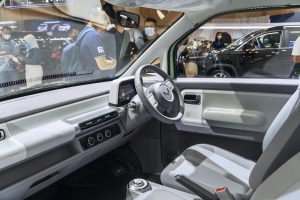Indonesia has announced a new series of incentives to encourage the purchase of locally produced and imported electric vehicles (EVs), the latest move in its push to transform itself into Southeast Asia’s key EV market and manufacturing hub.
According to a report by Reuters, the new rules, released on Tuesday evening, “will remove luxury tax on EVs for the 2024 fiscal year and import tax until the end of 2025.” The rules will also lower value-added tax from 11 percent to just 1 percent for EV buyers this year, extending a tax break that had expired at the end of last year.
The incentives are aimed at stimulating domestic demand for EVs by closing the purchase price gap between EVs and conventional vehicles. This, the government hopes, will incentivize foreign investment in local EV production facilities. Indonesia’s aims are ambitious: President Joko Widodo has set a target of having EVs make up 20 percent of all car sales by 2025, and the Indonesian government aims for 600,000 EVs to be domestically produced by 2030, more than the total number of cars (505,985) that were sold in the first half of this year.
As Rachmat Kaimuddin, deputy coordinating minister overseeing EV sector development, told reporters, “Hopefully these efforts can result in even more products and make them more affordable.”
All this is in support of Indonesia’s plan to turn itself into an EV production hub, taking advantage of the country’s vast reserves of nickel, an important material for EV batteries. EV adoption has many subsidiary advantages, including improving the air pollution that chokes Indonesia’s cities, and reducing the fiscal burden of sustaining the country’s fuel subsidies.
Subsidies for the purchase of EVs were first announced in December 2022 and came into effect the following March. They cover sales of 200,000 electric motorcycles and 35,900 electric cars, and the conversion of 50,000 combustion engine motorcycles to electric propulsion systems.
Jakarta has complemented this with a range of incentives for foreign EV manufacturers to invest in production facilities in Indonesia. According to a policy announced in December of last year, automakers that have invested in EV plants, or are planning to invest, would be eligible for tax incentives on imports of completely built-up EVs until 2025. These include the removal of import duties and the luxury goods sales tax on imported vehicles. (As Reuters noted at the time, earlier rules only granted these incentives to imports of knocked-down vehicles, which are delivered in parts and assembled in-country prior to being sold.)
The latest announcement reflects the Indonesian government’s desire to stay at the forefront of Southeast Asia’s EV production race. “Currently other countries, our neighbors, are encouraging electric vehicle adoption with various incentives,” Luhut Pandjaitan, the coordinating minister for maritime affairs and investment, said in March of last year. “They use massive state funds to make it attractive to invest in the electric vehicle industry.”
As James Guild wrote in this month’s edition of The Diplomat’s e-magazine, the effect of the subsidies so far has been less than the government might have hoped. The reason is that even when subsidies are subtracted from their price, EVs remain expensive and beyond the reach of many potential buyers. The limited recharging infrastructure, especially in the country’s densely populated urban areas, has also inhibited uptake.
As Fitch Ratings noted in a briefing paper last July, EV penetration reached 4.6 percent in June 2023, up from 2.0 percent in 2022, but “a major shift to fully electric models is unlikely, due to the narrow applicability of government incentives and a lack of EV options below IDR300 million [around $19,200].”
As Guild wrote, Indonesia also faces challenges in attracting investment from foreign EV manufacturers. The second-largest car manufacturing country in Southeast Asia, Indonesia has historically been reliant on investment from leading Japanese automakers that have been slow to pivot to EV production. It has also failed to lure the world’s leading EV manufacturers, such as the U.S.-based Tesla and China’s BYD.
It was perhaps for this reason that the government pushed out a deadline requiring companies to produce at least 40 percent of the content of EVs sold in Indonesia, from 2023 until 2026. This content threshold, which was implemented in order to promote local battery production, was a condition for EVs to qualify for tax incentives, including those announced and extended today. According to Fitch Ratings, only two models of electric vehicle – the Hyundai IONIQ 5 and Wulling Air EV – had managed to qualify for the tax break as of July.
































